More than 44 million Americans owe a collective $1.5 trillion in student loan debt. For the first time in history, that figure has eclipsed credit card debt and auto loan commitments, and it only continues to rise.
In fact, student loans equate to more than $30,000 for a quarter of millennials and over $100,000 for more than 1 in 10 people. And while 22% of adults between the ages of 18 and 34 came out of school debt-free, many more are tied to high monthly payments that could alter how they handle future finances.
A strict budget and student loan consolidation are both potential answers, but it begs the question: What are the aspects of education that make the debt worth it? Yes, you walk away with knowledge that can you a high SAT score and into the college of your dreams; however, the odds are also pretty high that you’ll graduate from college without having learned how to do your taxes, negotiate an appropriate salary, or even cook for yourself.
So which school courses are worth taking, and which ones do most graduates wished they’d skipped? To find out, we surveyed over 1,000 millennials. Keep reading for an exploration of the American public education system.
School Standards
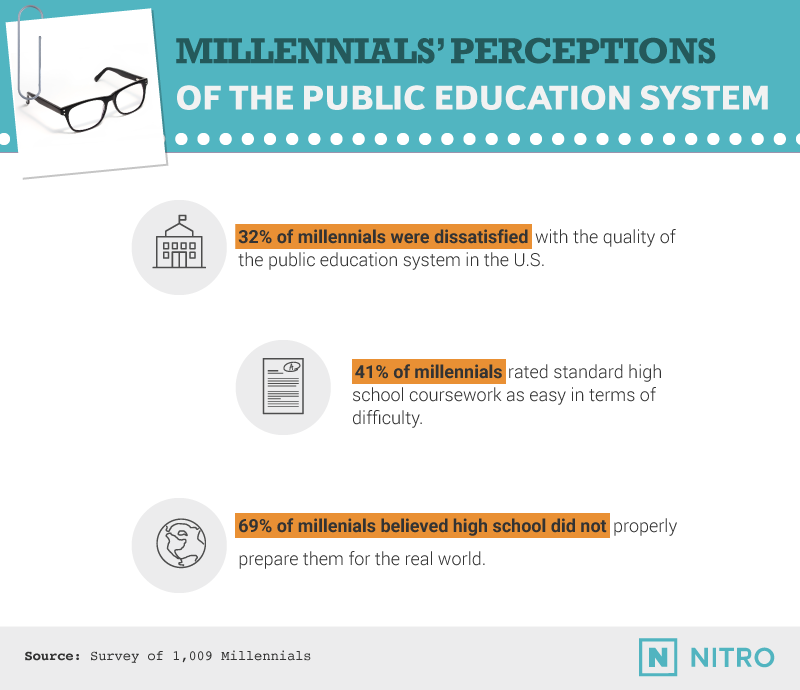
Even if you don’t necessarily need a college degree to be successful, you’ll likely feel pressured to get one anyway. And while getting into a good school, doing well in your classes, and walking across that stage can seem extremely important in high school, you might feel differently once it’s all said and done.
Nearly 1 in 3 millennials were dissatisfied with the quality of the U.S. public education system, and over 40% weren’t exactly challenged by the coursework they were assigned at school. More importantly, nearly 70% of millennials believed high school did not prepare them for the real world.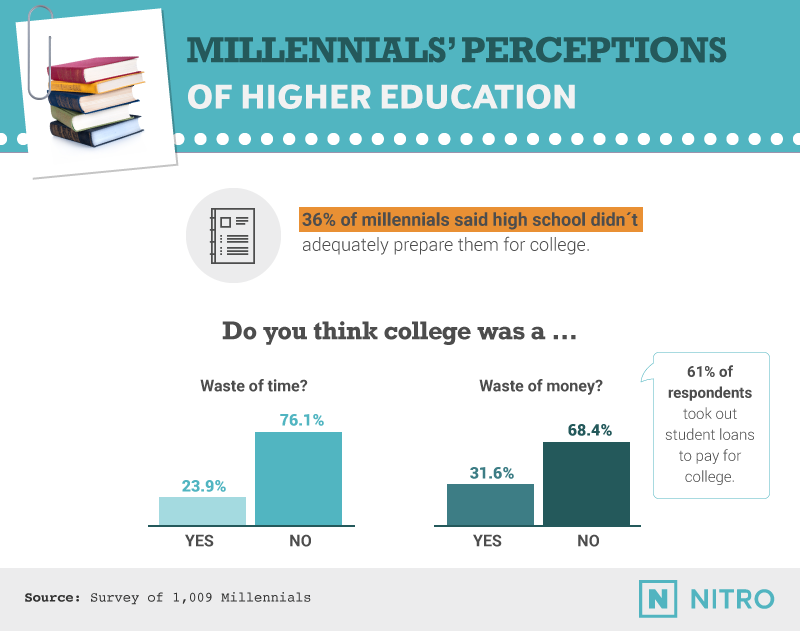
While some millennials didn’t think high school prepared them for college, a majority said college was not a waste of time (76.1%) or a waste of money (68.4%).
However, 61% of millennials took out student loans to pay for college, and the weight of those obligations could stay with them for years. Not only do many millennials push back major milestones (like getting married or buying a house) to afford their monthly student loan payments, but their mental and emotional health can be negatively affected as well.A-List Education
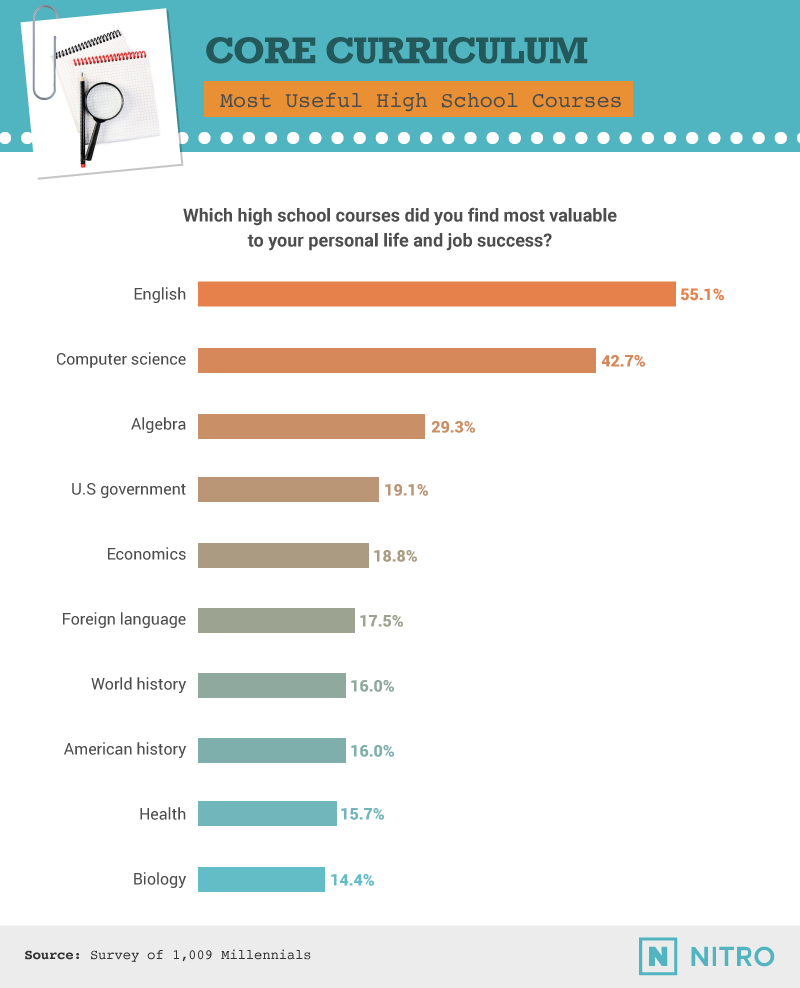
Deciding what to study will never be an absolute guarantee of success or failure in the professional universe. Even law school, once considered a sure thing in terms of earning a substantial paycheck, isn’t nearly as safe a choice as it used to be. Still, your long-term career goals should be a part of your college course consideration, and that means thinking about personal life and job success.
Despite the popular opinion that English degrees don’t pay off in the end, more than half of millennials suggested it was their English high school courses that were the most useful to their personal life and job success.
As well, it was computer science (nearly 43%), algebra (29%), and U.S. government courses (19%) that most prepared surveyed millennials for the real world. No matter your side of the political aisle, you’re likely to learn more about and develop a strong appreciation for your civic responsibilities when taking American government courses.Paying Attention
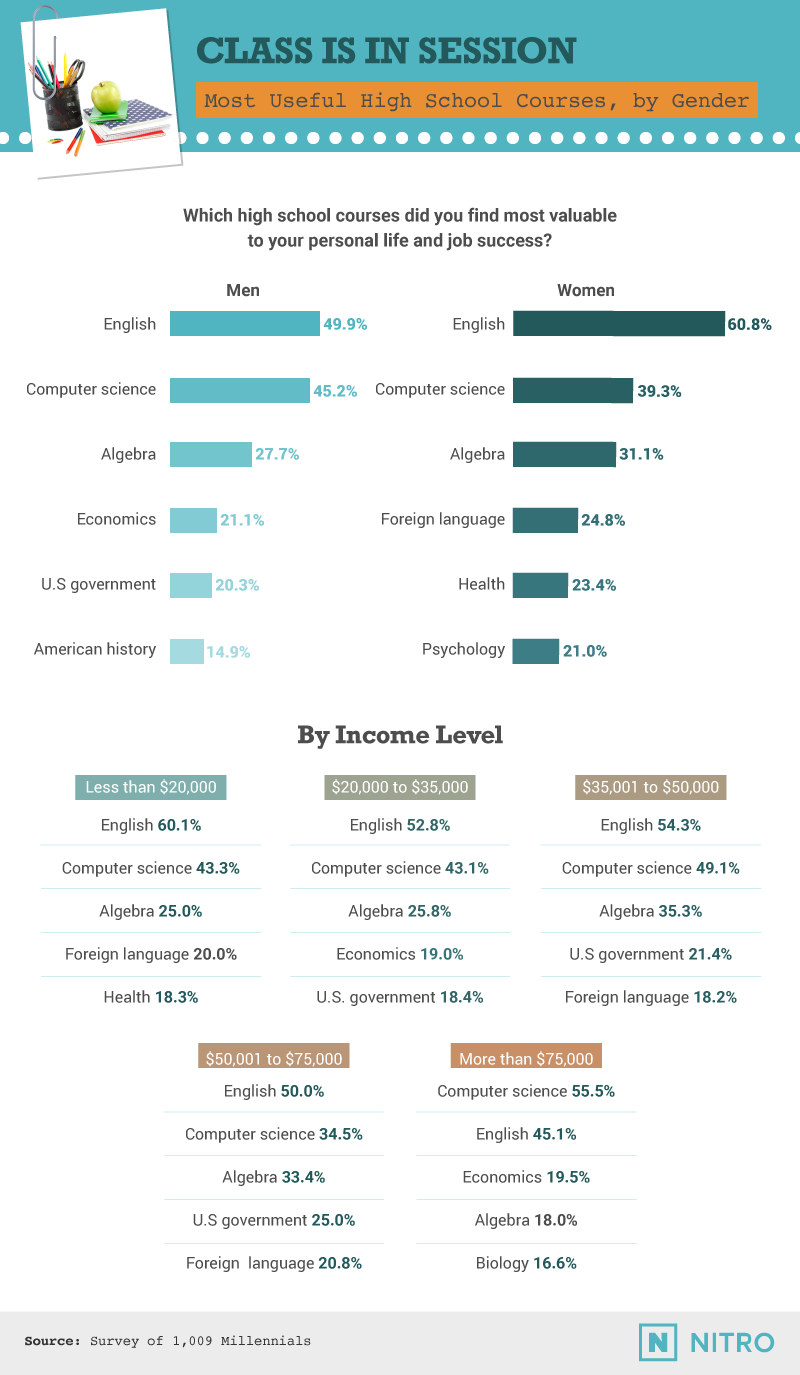
Men and women largely had the same opinions on which high school classes had the strongest impact on their lives. And while they were on the same page about English, computer science, and algebra, men opted for economics and U.S. government classes as being the most useful, while women voted for foreign language and health.
For some people, making money might be a key factor in degree decisions. Not only do you want to set yourself up for financial success, but you also want to make sure you can afford to pay off your student loans. High school English classes were regarded as the most beneficial, except among people earning more than $75,000 where computer science won out. Certain computer skills can help improve creativity and problem-solving capacity in young students, and computer and information science majors may lead to some of the most lucrative professions.Unfulfilled Curriculum
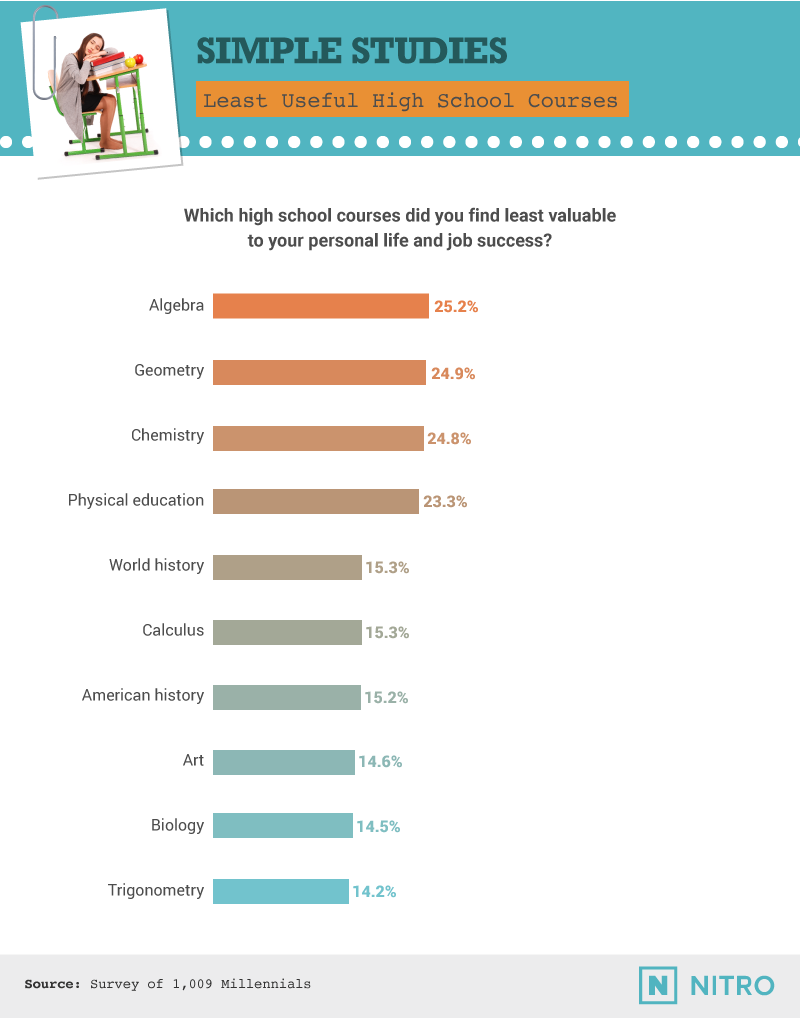
While some high school classes had a real-life application according to millennials, others were widely regarded as duds.
In fact, algebra and geometry were considered the least useful classes for millennials’ personal life and job success. While being able to do simple arithmetic without using a smartphone has merit, some experts argue that advanced mathematics might be less valuable compared to other topics. Nearly 25% of millennials felt the same way about chemistry.
Other classes that earned a similar distinction were physical education (more than 23%), world history, calculus, and American history (over 15% each).
Time Better Spent
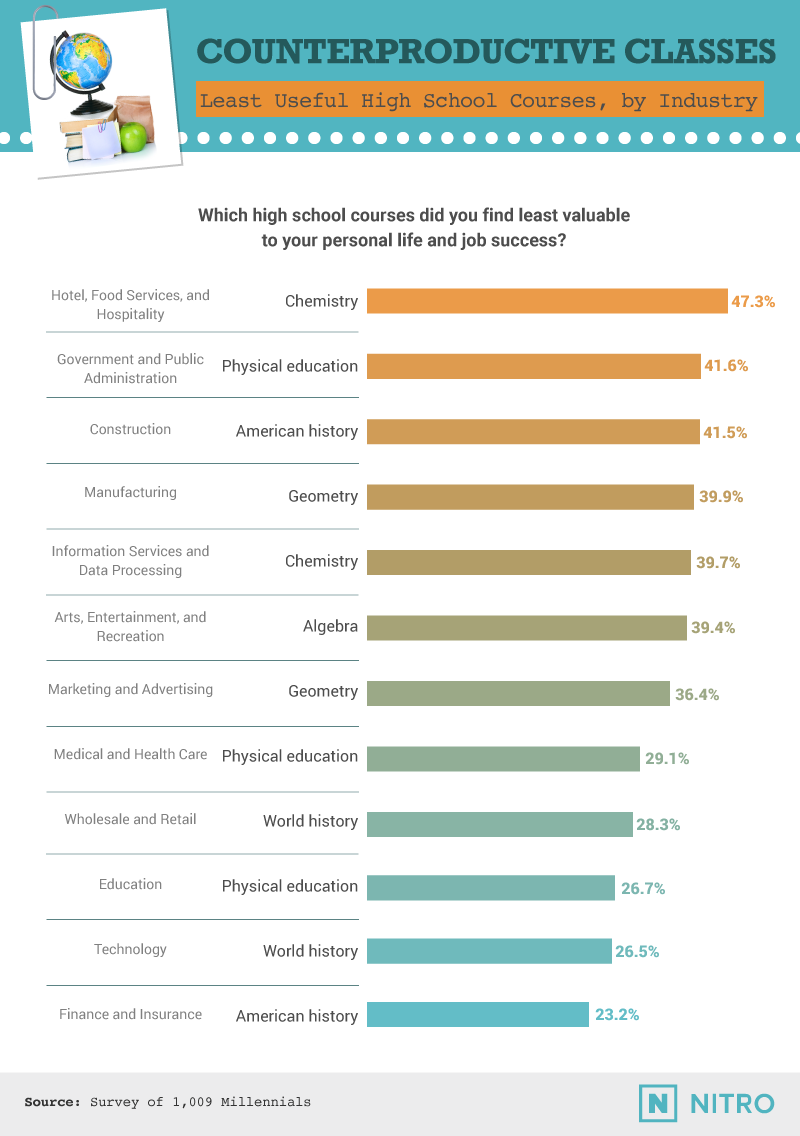
If you find yourself running a restaurant, managing a construction site, or leading an advertising firm, you may feel particularly uninspired looking back on the sheer number of hours spent learning about chemistry or world history.
According to roughly 47% of people working in hospitality, nothing was less useful to their personal life and job success than chemistry. Even though a basic understanding of chemistry is important for reading labels, making informed buying decisions, and having a better grasp on cooking, when you’re working the front desk at a restaurant or trying to provide the highest level of customer service, those lessons can feel miles away.
Another 2 in 5 millennials working in government and public administration said the same thing about physical education classes, and construction employees had similar feelings toward American history.
A Better Use of Time
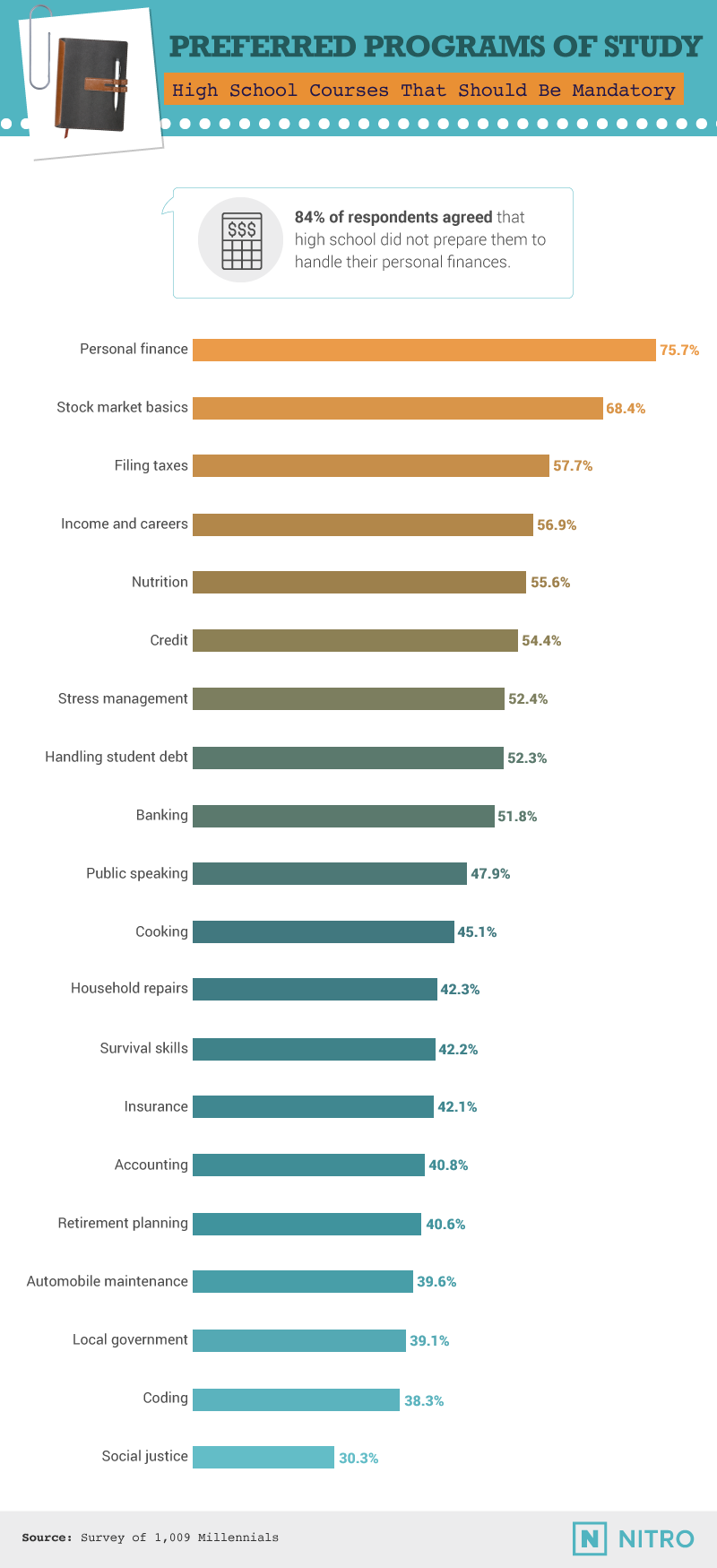
Overall, 84% of respondents agreed high school did not prepare them for handling personal finances. With that in mind, more than 3 in 4 millennials believed personal finance classes should be mandatory in high school – especially since many financial institutions will try to take advantage of students in college.
Their next requests for a revamped public school system involved learning the basics of the stock market (68%), filing taxes (58%), and income and careers (57%). While other courses like nutrition (56%) and cooking (45%) were common, it was matters of cash and capital (like how credit works and what to do with student loans) that really stood out.
Lessons You Need
Whether it’s the education you receive in high school or the one you pay for as a college student, you’re bound to take at least one class that doesn’t carry a lot of weight in your professional life. You might even wish you’d been a little more focused in your English and computer classes, especially considering the value of written and verbal communication in virtually any industry you pursue.
Still, one of the biggest gaps in your education might have to do with managing student loans, but that’s why Nitro has your back. Student loans typically amount to hundreds of dollars in monthly payments and fees. With our amazing team of qualified lenders, we’ll help you refinance and save so that you don’t have to decide between buying a house or car and paying off your loans. Visit Nitro College to learn more.Methodology and Limitations
The results of this study were acquired by administering an online survey through Amazon’s internet marketplace: Amazon Mechanical Turk. To qualify for this survey, respondents must have identified as millennials – all other generations were disqualified before answering additional questions. Additionally, all respondents must have attended public high school for a minimum of one school year, and respondents who only attended private schools were disqualified. An attention-check question was used to filter and exclude respondents who entered incorrect data.
After compiling the survey data, we analyzed the gender demographics of respondents and found precisely 50% identified as male and 50% as female. Our team of researchers weighted the survey data to a study of millennials in America, commissioned by think tank Brookings Institution for race.
The main limitation of this study is the different types of courses that are taught in high schools across the nation. We compiled a list of standard subjects from several reputable sources and used the most commonly taught courses in our survey questions. Respondents were presented with a “not listed” answer choice and had the option to fill in the free response section with a course they found most or least useful.
Sources
- https://www.forbes.com/sites/zackfriedman/2018/06/13/student-loan-debt-statistics-2018/#790825d57310
- https://www.nbcnews.com/news/us-news/poll-majority-millennials-are-debt-hitting-pause-major-life-events-n862376
- http://mentalfloss.com/article/75535/11-life-skills-you-dont-learn-college
- https://www.inc.com/sujan-patel/7-reasons-you-dont-need-a-college-degree-to-earn-b.html
- https://www.theatlantic.com/education/archive/2016/09/college-is-still-the-promised-land-for-high-school-students/499865/
- https://www.forbes.com/sites/sarahlandrum/2017/10/20/the-impact-of-student-loan-debt-on-millennial-happiness/#53e864db7125
- https://www.marketwatch.com/story/why-college-students-shouldnt-be-afraid-of-english-degrees-2016-12-09
- https://www.theodysseyonline.com/6-reasons-american-government-class
- https://www.idtech.com/blog/5-reasons-your-child-should-learn-to-code
- https://www.thepennyhoarder.com/life/best-college-majors/
- https://www.npr.org/sections/ed/2016/03/02/468251401/lets-stop-requiring-advanced-math-a-new-book-argues
- https://www.thoughtco.com/reasons-to-study-chemistry-609210
- https://www.careerbuilder.com/advice/these-4-communication-skills-will-help-you-land-any-job
- https://www.nytimes.com/2016/06/19/business/dealbook/an-expensive-law-degree-and-no-place-to-use-it.html
